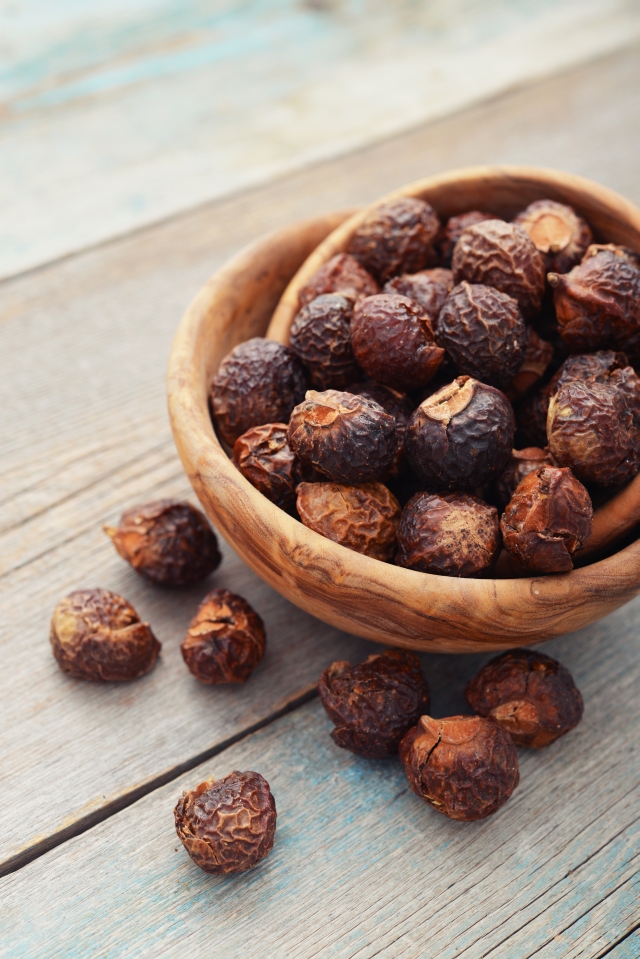 For hundreds of years, people in India and Nepal have been doing their laundry and cleaning with Soap nuts. The Soapnut is the dried fruit of the Ritha tree and the saponin released is a 100% substitute to normal detergents.
For hundreds of years, people in India and Nepal have been doing their laundry and cleaning with Soap nuts. The Soapnut is the dried fruit of the Ritha tree and the saponin released is a 100% substitute to normal detergents.
SoapNuts can be used for cleaning basically anything, from washing clothes, dishes, cloth nappies, as a liquid soap, cleaning and shining ornaments, household cleaner etc.
SoapNuts are highly-effective and gentle at the same time. It will leave your laundry fresh and clean and compared to other detergents, its mildness will keep colours bright, maintaining fabric structure of your clothes for longer periods. Soap nuts can be used on all fabrics, at all temperatures and they work in front and top loaders.
SoapNuts are allergy-free and hence are good for your skin especially good for babies, eczema and sensitive skin. This chemical free product is excellent for washing children’s clothing and cloth nappies.
SoapNuts are both ecological and economical when compared to other forms of detergents. Buy Soap Nuts today either from our online shop or from any of our retailers.
SoapNuts are:
- SLS/Sulfate Free
- Parabens Free
- Perfume Free
- Bleach Free
- Chlorine Free
- Phthalates Free
- Phosphates Free
- Formaldeyde Free
- Petro-chemical Free
Fair Trade
Yes, the Soap Nuts we are selling are fairly traded (the fair trade isn't certified). Our supplier is also involved in contract farming. It means that they are supplying the farmers with selected input including technical advice if required. They also supply the farmers with the basic necessities like Food, shelter, clothes, money and medicines.
Soap Nuts trees grow wild over some parts of India & Nepal. This is classified as wild produce and comes from lands that are completely organic and where no pesticides, insecticides or any artificial mediums have ever been used.
SoapNuts trees information
Sapindus Mukorossi (Himalayan) is the Soap Nuts tree that grows in North India. Their fruits and seeds are slightly bigger than the South Indian Soap Nuts. The shells are a golden colour when harvested but become a darker red colour once dried. The trees grow upto heights of 20 meters. Flowering and fruiting occurs in the months of May to February.
 Grow your own SoapNuts tree!
Grow your own SoapNuts tree!
Its easy if you have the seeds!!! SoapNuts seeds germinate quite easily. Just soak the seeds for 24 hours in warm water. Then sow them about an inch into the soil. A sunny location with well drained soil is ideal. Be patient however, the tree starts flowering after 9 years. For further information go to "Plant a tree"
Why and how do SoapNuts clean?
Soap Nuts contain saponin, a natural and effective surfactant. A surfactant is a substance that reduces the surface tension of liquids so that the liquid spreads out, this allows for easy flow throughout water and the release of dirt, oils, and grime.
SoapNuts used in Ayurveda practises
SoapNuts are used in Ayurveda practises as an ingredient in shampoos and cleansers. In scalp treatments they are used to treat headlice, dandruff and hairloss. For skincare they are used traditionally to treat mild to moderate skin problems such as eczema and psoriasis. As ayurvedic beauty treatments they are used to eliminate fine lines and freckles and to heal cracked skin and remove chemical stains.
It is claimed the fruits are credited with expectorant and emetic properties and when prepared by an Ayurvedic doctor it can treat epilepsy, chlorosis and excessive salivation. It is also used as a sedative to the uterus and is used to ease childbirth. It can also be prepared as a digestive aid, an anti-venom, or to treat diarrhea, cholera and paralysis.
The SoapNuts berry is so rich in iron it is considered a hemolytic and is used often to treat anemia.
Try this traditional ayurvedic recipe for a relaxing bath:
- 1 cup raw honey
- 10 drops lavender oil
- 1/4 cup papaya leaves
- 1/4 cup neem leaves (Azadirachta indica)
- 3 Tablespoons Soapnut powder (cracked soap nut shells)
- 3 Tablespoons shikakai powder (Fruit for the Hair)
- 2 teaspoons kastrui manjal (Curcuma aromatica)
- 2 teaspoons sandalwood powder
Blend herbs with a mortar and pestle and then pour into bath with honey and oil. Relax.
Storing SoapNuts
Soap Nuts absorb moisture very easily. They become dark & sticky in a very short period of time if left exposed to air. Ideally the nuts should be packed in an airtight container or the plastic bag should be tied tight with a rubber band.
However, sticky SoapNuts do not mean that they have gone bad. They will still wash & clean perfectly. SoapNuts powder, however, if not stored perfectly in air tight conditions, will become lumpy very easily. Once in lump form, the powder is difficult to use, even though it still retains all its original washing properties.
Good for your skin
SoapNuts are Hypoallergenic. They are naturally antibacterial and antifungal and very gentle on the skin. Washing your skin regularly with soapnuts can also help prevent many skin diseases and is gentle enough to look after your skin. The chemicals in detergents are absorbed through the skin and into the blood stream. In comparison, SoapNuts are a 100% natural product.
Recent medical findings
Clinical trails have been conducted on the use of neem, quinine hydrochloride and SoapNuts extract as a spermicide, replacing the use of Nonoxynal-9, and it is now being produced and distributed in India. Tests of its effectiveness showed that it compared favorably with the chemical-based foams and gels. It was safer and easier to use, caused no irritation or discomfort, it was nearly 100% effective. The effect does not appear to be hormonal and is considered a safe and effective alternative to other methods that use hormones.